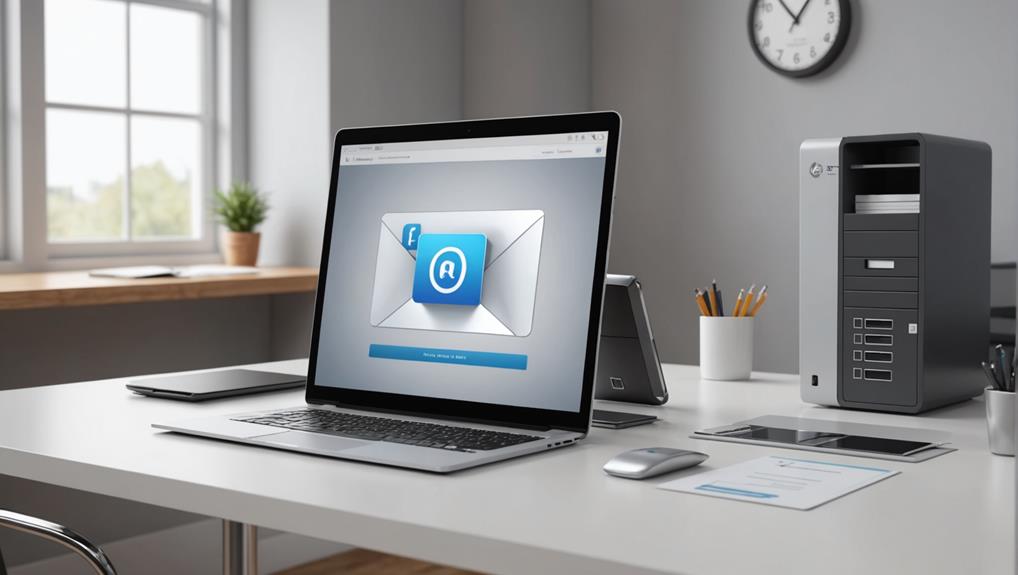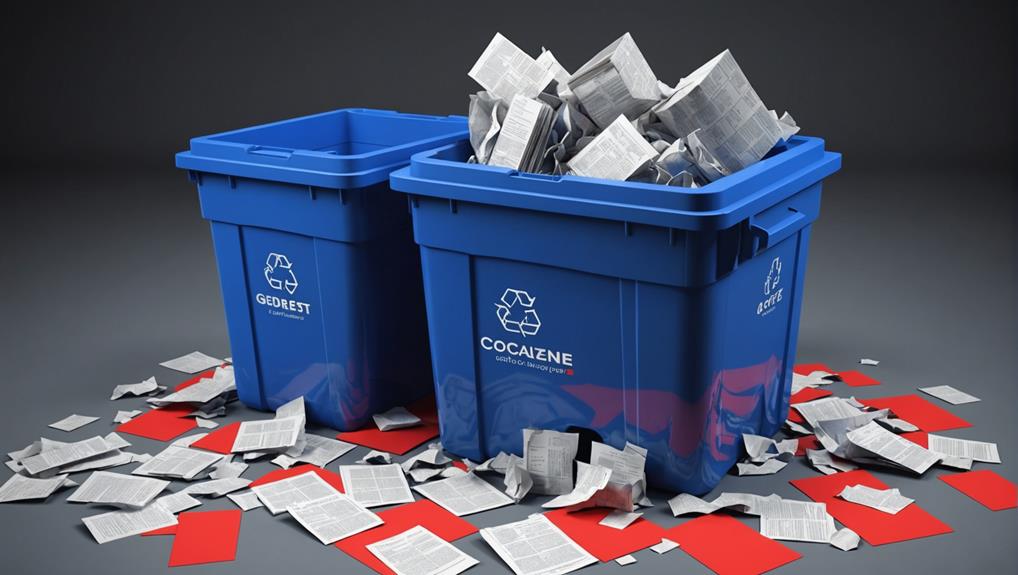
When you archive a message, you're not deleting it; you're just moving it out of your main inbox to declutter while keeping the message stored safely for future access. Think of it as tucking something away in a storage closet where you can retrieve it whenever you need it. This action is different from deleting a message, which permanently removes it, as if throwing it out with the trash. By archiving, you maintain a clean, organized digital environment without losing any of your information. Exploring further might just reveal more about managing your digital communications effectively.
Understanding Email Archiving

Email archiving lets you store your messages without cluttering your inbox. It's like having a secret room where all your old letters and memories are kept safe, but out of the way, so your living space – or in this case, your inbox – remains tidy and manageable. You're not alone in feeling overwhelmed by an overflowing inbox. Imagine being part of a community where everyone keeps their digital space clean and organized. That's what email archiving offers—a sense of belonging to a group of efficient, organized individuals.
When you archive an email, you're not deleting it; you're simply moving it from the immediate view. It's still there, just stored away neatly. This ensures that when you need to retrieve an old conversation or a document, you can easily find it without sifting through hundreds of emails. Think of it as putting your seasonal clothes into storage; they're out of sight, but readily accessible when needed.
The Process of Archiving Emails
Now, let's explore how you can start archiving your emails effectively. By archiving, you're not just cleaning up your inbox; you're also keeping a record of important communications that you might need to revisit. It's like you're creating a personal library of your digital conversations, where everything is neatly organized and easily accessible.
First, you need to decide which emails deserve a spot in your archive. Think about whether the email contains information you'll want to refer back to, like confirmations, receipts, or important discussions. You're curating a collection of your digital interactions, so choose wisely.
Next, most email platforms, such as Gmail or Outlook, have an "Archive" button. Typically, you select the emails you want to archive, and with one click, they move out of your inbox into the archive folder. They're not gone; they're just stored away. You're essentially tucking them out of sight but keeping them within easy reach.
Differences Between Archiving and Deleting

Understanding the differences between archiving and deleting is crucial as it affects how you manage your digital communications. When you archive a message, you're essentially tucking it away for safekeeping. It's still there, just out of your immediate view, allowing you to declutter your inbox without losing any content. Think of it as storing your old yearbooks in the attic; they're out of sight but still part of your collection.
On the other hand, deleting a message is like throwing away those old magazines that have been piling up. Once deleted, the message is gone for good, typically moved to a trash or bin folder, and after a certain period, it's permanently erased. This action is definitive and can't be undone without specific recovery tools, which might not always work.
It's like being part of a community. Archiving lets you keep memories and messages without them crowding your daily space, whereas deleting is knowing when to let go of what's no longer needed. Both processes help you maintain a clean, organized environment, crucial for effective communication and peace of mind in your digital world.
How to Archive Messages Effectively
To archive messages effectively, you'll need to prioritize which communications are important enough to save for future reference. Remember, it's about keeping what matters most at your fingertips, ensuring you're part of every important conversation, even when you're catching up later.
Start by creating clear categories or folders that resonate with your daily tasks and interactions. Labels like “Project Updates,” “HR Communications,” and “Client Feedback” can help you sort messages quickly. This organization not only saves time but also makes you an integral part of your team's ongoing dialogues.
Make it a habit to review your inbox weekly. Deciding what to archive as you go prevents a buildup of less relevant messages, keeping your digital space tidy and your mind clear. This way, you're always prepared and connected, able to provide inputs and take action without delay.
Retrieving Archived Emails

You can quickly retrieve archived emails by accessing the specific folder or label where they were initially categorized. Whether you're part of a busy team at work or managing your personal emails, knowing you're just a few clicks away from any archived message makes you feel included and in control. Open your email client, and you'll typically find an ‘Archived' folder or a label like ‘All Mail' in Gmail. It's reassuring to know that your emails aren't lost—they're simply out of the way until you need them.
To find a specific archived email, use the search bar. Enter keywords, sender's name, or the date of the email. It's like having a conversation with an old friend—you know they're there for you, just a call—or in this case, a search—away.
If you're on a mobile device, the process mirrors the desktop experience. Tap on the menu, scroll to your ‘Archived' folder, and tap to open. It's comforting to know that whether you're on the go or at your desk, your archived messages are with you, ready to be revisited whenever you need them.
Benefits of Email Archiving
While knowing how to retrieve archived emails is valuable, considering the benefits of email archiving can significantly enhance your organizational efficiency. Think about it: when you archive, you're not just clearing up your inbox—you're sorting your digital life, making sure each message is right where you need it when you need it. You're part of a smart crowd who values order and accessibility.
Archiving helps protect your important messages from accidental deletion. Imagine losing a crucial contract or a beloved memory; archiving acts as a safety net, ensuring that what matters to you stays secure in your digital vault. You're safeguarding not just data, but pieces of your digital identity.
Moreover, with archiving, you can improve your email system's performance. Less clutter in your active inbox means faster search results and quicker loading times. You're not alone in feeling overwhelmed by an overflowing inbox; everyone craves simplicity and efficiency. By archiving, you join a community of efficient organizers who thrive in a streamlined environment.
Conclusion
So, you've learned that archiving emails isn't the same as deleting them. By archiving, you're simply tucking messages away safely without clogging up your inbox. Remember, it's easy to pull them back whenever you need them. Start using this feature to keep your inbox clean and your important emails accessible. You'll see how much smoother managing your email can be, especially when you need to find those old messages for reference. Happy archiving!






